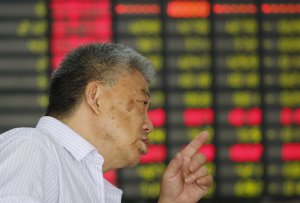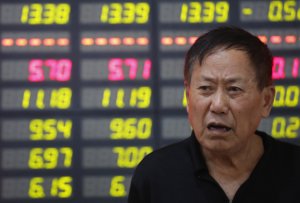Way to go China communists. The market in Asia takes another hit due to the actions of China. I think they will eventually adopt a system like we have here in the US. We are not communist at least not all the way. We are somewhere in the middle. Not over regulated but still regulated by the government enough to be noticed by the business community. At any rate when the government intrudes too much you will always scare away potential investors and that is the bottom line. Without investors the economy will not be healthy and people will suffer. What do you think about this? Tell us. Don't forget to follow us. Thanks. Here is the related story from the Associated Press.
MANILA, Philippines (AP) — Asian stock markets floundered
Friday as China pressed ahead with industrial restructuring that is
partly to blame for slowing growth in the world's No. 2 economy.
European markets mostly posted slight gains.
Beijing has ordered companies to close factories in 19 industries where overproduction has led to price-cutting wars, affirming its determination to push ahead with a painful makeover of the economy. That move followed weak manufacturing data on Wednesday.
Communist leaders are trying to reduce reliance on investment and trade. But a slowdown that pushed China's economic growth to a two-decade low of 7.5 percent last quarter had earlier prompted suggestions they might have to reverse course and stimulate the economy with more investment to reduce the threat of job losses and unrest.
Japan's Nikkei 225 stock average closed 3 percent down at 14,129.98 as the yen rose against the dollar. Japan on Friday said consumer prices rose in June for the first time in more than a year, an early sign Prime Minister Shinzo Abe's stimulus policies are working, which if sustained could ultimately push interest rates up. There is also nervousness about whether Abe will deliver on his vow to complete all the reforms crucial to ending Japan's long economic slump.
Hong Kong's Hang Seng was up 0.3 percent to 21,968.95 while China's Shanghai Composite dropped 0.5 percent to 2,010.85.
Manuel Antonio Lisbona, from Manila's PNB Securities Inc., said the mixed trading could be attributed to continuing market reaction to feeble economic data from China and unexciting corporate earnings reports.
"It's a continuation of the sentiment for the past few days," he said. "The markets are still digesting the implications of the weak China data that came out earlier this week."
Elsewhere in the region, Australia's S&P/ASX 200 rose 0.1 percent to 5,042. Stocks in South Korea and New Zealand finished slightly higher while benchmarks in Singapore, the Philippines, Malaysia, Indonesia and Taiwan fell.
Andrew Sullivan, principal Asia trader for Kim Eng Securities in Hong Kong, said the Japanese market has been affected by the strengthening of the yen overnight as people wait for comments from Prime Minister Abe about the next economic reform steps the government will take. He said the market is watching for signs of changes in agriculture, employment, the pharmaceutical industry and taxes.
Overall, trading has been quiet as a lot of people wait for next week's meeting of the Federal Open Market Committee in the U.S. for guidance on the tapering of U.S. government bond purchases, he said.
Since late last year, the U.S. Federal Reserve has been buying $85 billion in Treasury and mortgage bonds a month — a move that has kept long-term rates near record lows and supported economic recovery.
In morning European trade, the FTSE 100 index of leading British shares was up 0.1 percent to 6,597.11. Germany's DAX was down 0.1 percent at 8,294.40 and France's CAC-40 added 0.8 percent to 3,988.94.
Wall Street futures trading pointed to a flat open in the U.S., with S&P 500 and Dow futures little changed.
In energy trading, benchmark crude was down 65 cents at $104.84 a barrel in electronic trading on the New York Mercantile Exchange. It rose 10 cents to close at $105.49 on Thursday.
The euro was little changed at $1.3283 from $1.3277 late Thursday. The dollar dropped to 98.63 yen from 99.15 yen.
Beijing has ordered companies to close factories in 19 industries where overproduction has led to price-cutting wars, affirming its determination to push ahead with a painful makeover of the economy. That move followed weak manufacturing data on Wednesday.
Communist leaders are trying to reduce reliance on investment and trade. But a slowdown that pushed China's economic growth to a two-decade low of 7.5 percent last quarter had earlier prompted suggestions they might have to reverse course and stimulate the economy with more investment to reduce the threat of job losses and unrest.
Japan's Nikkei 225 stock average closed 3 percent down at 14,129.98 as the yen rose against the dollar. Japan on Friday said consumer prices rose in June for the first time in more than a year, an early sign Prime Minister Shinzo Abe's stimulus policies are working, which if sustained could ultimately push interest rates up. There is also nervousness about whether Abe will deliver on his vow to complete all the reforms crucial to ending Japan's long economic slump.
Hong Kong's Hang Seng was up 0.3 percent to 21,968.95 while China's Shanghai Composite dropped 0.5 percent to 2,010.85.
Manuel Antonio Lisbona, from Manila's PNB Securities Inc., said the mixed trading could be attributed to continuing market reaction to feeble economic data from China and unexciting corporate earnings reports.
"It's a continuation of the sentiment for the past few days," he said. "The markets are still digesting the implications of the weak China data that came out earlier this week."
Elsewhere in the region, Australia's S&P/ASX 200 rose 0.1 percent to 5,042. Stocks in South Korea and New Zealand finished slightly higher while benchmarks in Singapore, the Philippines, Malaysia, Indonesia and Taiwan fell.
Andrew Sullivan, principal Asia trader for Kim Eng Securities in Hong Kong, said the Japanese market has been affected by the strengthening of the yen overnight as people wait for comments from Prime Minister Abe about the next economic reform steps the government will take. He said the market is watching for signs of changes in agriculture, employment, the pharmaceutical industry and taxes.
Overall, trading has been quiet as a lot of people wait for next week's meeting of the Federal Open Market Committee in the U.S. for guidance on the tapering of U.S. government bond purchases, he said.
Since late last year, the U.S. Federal Reserve has been buying $85 billion in Treasury and mortgage bonds a month — a move that has kept long-term rates near record lows and supported economic recovery.
In morning European trade, the FTSE 100 index of leading British shares was up 0.1 percent to 6,597.11. Germany's DAX was down 0.1 percent at 8,294.40 and France's CAC-40 added 0.8 percent to 3,988.94.
Wall Street futures trading pointed to a flat open in the U.S., with S&P 500 and Dow futures little changed.
In energy trading, benchmark crude was down 65 cents at $104.84 a barrel in electronic trading on the New York Mercantile Exchange. It rose 10 cents to close at $105.49 on Thursday.
The euro was little changed at $1.3283 from $1.3277 late Thursday. The dollar dropped to 98.63 yen from 99.15 yen.



No comments:
Post a Comment